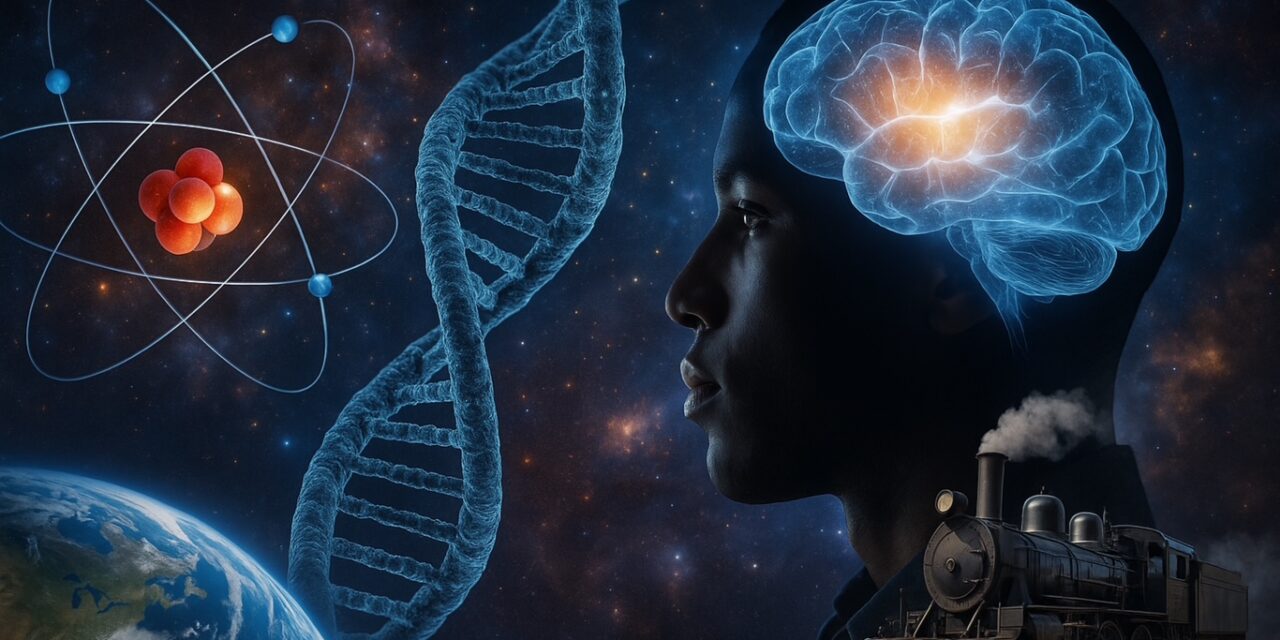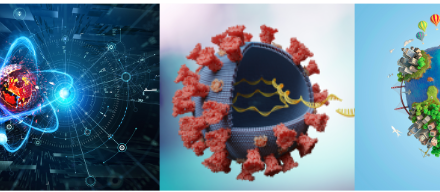Introduction: The Scientific Revolution and Human Self-Understanding
Since 1851, humanity has undergone the most profound transformation in understanding our own nature in recorded history. The scientific revolution that began with Maxwell’s electromagnetic waves and Darwin’s insights into evolution has fundamentally altered how we understand what it means to be human. We have discovered that we are not separate from nature but are nature—temporary arrangements of atoms forged in stellar furnaces, shaped by billions of years of evolution, and embedded within complex systems that span from quantum fields to cosmic structures.
This transformation in understanding represents more than academic progress; it challenges the very foundations of how we see ourselves, our place in the universe, and our responsibilities as conscious beings capable of understanding our own existence. The convergence of discoveries in physics, biology, thermodynamics, and complexity science has revealed human nature to be far stranger, more wonderful, and more interconnected than any previous generation could have imagined.
Yet paradoxically, the more we learn about ourselves through science, the more mysterious we become. Each answer reveals new depths of complexity, each breakthrough opens new questions about consciousness, meaning, and purpose. We stand today with unprecedented knowledge about human nature while simultaneously confronting the humbling recognition that some of the deepest questions about what it means to be human may be more profound than we previously realized.
The Physical Foundations: We Are Made of Star Stuff
Our modern understanding of human nature begins with the recognition that we are fundamentally physical beings, composed of atoms and molecules that obey the same laws governing all matter in the universe. The calcium in our bones was created in exploding stars billions of years ago. The carbon that forms the backbone of our DNA was forged in stellar furnaces. The iron in our blood was born in the death throes of massive stars. We are, quite literally, made of star stuff—temporary arrangements of cosmic material that have organized themselves into conscious, thinking beings.
This cosmic perspective fundamentally challenges the notion that humans are separate from or above nature. We are not observers of the universe but participants in it, products of the same evolutionary processes that have shaped everything from galaxies to bacteria. Our atoms have been cycling through the cosmos for nearly the entire history of the universe, and they will continue to do so long after our individual existence has ended.
The implications extend beyond poetry into the practical realm of human experience. The quantum fields that permeate all of space give our particles their mass through the Higgs mechanism. The electromagnetic forces that bind our atoms together operate according to quantum principles that seem to violate common sense—particles existing in multiple states simultaneously, uncertainty as a fundamental feature of reality, and the strange interconnectedness revealed by quantum entanglement.
This quantum substrate of our existence suggests that the solid, continuous experience of being human emerges from a probabilistic, discontinuous foundation where certainty is impossible and interconnection is fundamental. We are classical beings built from quantum components, experiencing stability and continuity that emerge from underlying processes governed by probability and uncertainty.
The Biological Foundation: Evolution and the Deep History of Life
The discovery that all life on Earth shares common ancestry has revolutionized our understanding of human nature by placing us firmly within the tree of life rather than above it. We carry within our bodies the molecular machinery developed by bacteria billions of years ago. Our cells contain organelles that were once independent microorganisms. Our genetic code is written in the same language used by every living thing on the planet.
Evolution through natural selection explains not only our physical characteristics but also the deep structures of human psychology, emotion, and behaviour. Our brains are not blank slates, but organs shaped by millions of years of evolutionary pressures. Our capacity for language, our social instincts, our emotional responses, and even our moral intuitions bear the marks of our evolutionary heritage.
Yet human evolution has taken a unique turn. Through the development of culture, language, and technology, we have become capable of directing our own evolutionary trajectory. We are the first species to understand evolution itself, to manipulate our own genes, and to create artificial selection pressures through our technologies and social institutions. We have moved from being purely products of evolution to becoming active participants in evolutionary processes.
This evolutionary perspective reveals human nature as both continuous with other life and genuinely unique. We share fundamental biological processes with bacteria, emotional systems with other mammals, and cognitive abilities with other primates. Yet the emergence of symbolic language, cumulative culture, and scientific reasoning has created capabilities that appear to be unprecedented in the history of life on Earth.
The Thermodynamic Perspective: Humans as Dissipative Structures
Thermodynamics provides another lens for understanding human nature by revealing that we are far-from-equilibrium dissipative structures that maintain our organization by accelerating entropy production in our environment. Like all living systems, we exist by capturing energy gradients and using them to maintain our complex internal organization while exporting disorder to our surroundings.
This thermodynamic perspective helps explain why humans are inherently active, creative, and transformative beings. We cannot exist in static equilibrium; we must continuously process energy and information to maintain our existence. Our metabolism, our neural activity, our social interactions, and our technological activities all represent thermodynamic processes that maintain human organization while contributing to the universe’s overall tendency toward entropy increase.
Human civilization represents a new phase in Earth’s thermodynamic evolution, where conscious intelligence begins to direct energy flows on a planetary scale. Our technologies, from fire to nuclear reactors, are thermodynamic devices that allow us to capture and process energy in unprecedented ways. Our social institutions, economic systems, and cultural practices all involve energy transformations governed by thermodynamic principles.
This perspective suggests that sustainability must be understood in thermodynamic terms. Truly sustainable human societies must work within Earth’s energy budget while enhancing rather than degrading the planet’s capacity for self-regulation. The current global environmental crisis can be understood as a thermodynamic disequilibrium where human energy processing has begun to destabilize the larger Earth system that sustains us.
The Complexity Revolution: Emergence and Self-Organization
Perhaps the most profound insight about human nature comes from complexity science, which reveals that we are emergent beings whose consciousness, intelligence, and social capabilities arise from the self-organizing interactions of simpler components. The human brain contains roughly 86 billion neurons, each connecting to thousands of others in networks of staggering complexity. Yet somehow this neural network gives rise to consciousness, thought, emotion, and creativity—properties that cannot be predicted from studying individual neurons in isolation.
This emergence is not limited to individual consciousness but extends to all levels of human organization. Language emerges from the interactions among individual speakers. Culture emerges from social interactions. Economic systems emerge from individual exchanges. Scientific knowledge emerges from the collaborative efforts of research communities. In each case, the whole becomes genuinely greater than the sum of its parts.
Human societies themselves function as complex adaptive systems that exhibit self-organization, emergence, and evolution. Cities, institutions, markets, and technological systems all demonstrate the same principles of complexity that govern individual brains, ecosystems, and other natural systems. This suggests that human social organization is not artificial but represents a natural expression of complexity principles operating at larger scales.
The complexity perspective also reveals that humans are fundamentally learning, adapting beings. Our brains are constantly reorganizing themselves based on experience. Our societies continuously evolve new institutions and practices. Our technologies co-evolve with our social systems and environmental challenges. We are not fixed entities but dynamic processes of ongoing adaptation and emergence.
Consciousness: The Deep Mystery
Despite remarkable progress in neuroscience and cognitive science, consciousness remains the deepest mystery in our scientific understanding of human nature. How does subjective experience arise from objective neural processes? Why should there be anything it is like to be human? How does the objective firing of neurons give rise to the subjective experience of seeing red, feeling pain, or having a thought?
Current neuroscience can map the neural correlates of consciousness and understand many cognitive processes in computational terms, but the emergence of subjective experience from objective neural activity remains unexplained. This hard problem of consciousness sits at the intersection of complexity science, neuroscience, and philosophy, challenging our understanding of the relationship between mind and matter.
Some researchers suggest that consciousness might be an emergent property of complex information processing systems, arising when neural networks achieve sufficient complexity and integration. Others propose that consciousness might be a fundamental feature of the universe, present at some level in all information-processing systems. Still others argue that consciousness might require quantum processes that operate differently from classical neural computation.
The mystery of consciousness has profound implications for how we understand human nature. If consciousness is truly emergent from complex neural processes, it suggests that the subjective experience of being human represents a genuine novelty in the universe—something unprecedented that has emerged through the self-organization of matter and energy over cosmic time scales.
Social Nature: Cooperation and Cultural Evolution
Modern research has revealed that humans are fundamentally social beings whose individual development and functioning depend critically on social interaction and cultural learning. Our brains develop properly only through social interaction. Our languages are learned through immersion in linguistic communities. Our moral intuitions are shaped by cultural practices. Even our individual identities are constructed through social processes.
This social nature extends beyond psychology into biology. Humans have evolved as cooperative breeders who raise children collectively, share resources extensively, and engage in large-scale collaboration. Our capacity for trust, reciprocity, and collective action appears to be deeply rooted in our evolutionary history as social mammals living in small, interdependent groups.
Cultural evolution represents a new form of inheritance that operates alongside genetic evolution but at much faster timescales. Ideas, practices, technologies, and institutions can evolve through variation, selection, and transmission across generations, allowing human societies to adapt rapidly to changing conditions. This cultural inheritance system has enabled humans to accumulate knowledge and capabilities across generations, leading to the cumulative complexity of modern human civilization.
The social nature of humanity also reveals that individual human nature cannot be understood in isolation from the social and cultural contexts within which individuals develop. Human nature is not a fixed essence but a dynamic product of the ongoing interaction between genetic inheritance, developmental processes, and social-cultural environments.
Information Processing and Technology
Humans are fundamentally information-processing beings whose capacities for symbolic representation, abstract reasoning, and cumulative learning distinguish us from other species. Our ability to create and manipulate symbols allows us to represent absent objects, imagine counterfactual scenarios, and engage in collective reasoning about abstract concepts.
This information-processing capability has enabled humans to extend our cognitive abilities through external technologies. Writing systems extend our memory capabilities. Mathematical notation extends our reasoning abilities. Scientific instruments extend our sensory capabilities. Digital technologies are now extending our information processing capabilities in unprecedented ways.
The relationship between humans and technology is becoming increasingly intimate as digital systems become more sophisticated and integrated into human cognitive and social processes. Artificial intelligence systems are beginning to exhibit capabilities that rival or exceed human performance in specific domains, raising questions about the future relationship between human and artificial intelligence.
Some researchers suggest that the boundary between human and artificial intelligence may become increasingly blurred as technologies become more integrated with human cognitive processes. Brain-computer interfaces, genetic engineering, and artificial enhancement may transform human nature itself, raising profound questions about the future of human identity and consciousness.
Moral and Meaning-Making Nature
Humans appear to be uniquely concerned with questions of meaning, purpose, and moral value. We are the only known species that engages in systematic moral reasoning, creates elaborate meaning systems, and experiences existential questions about the purpose and significance of existence.
This meaning-making capacity may be related to our advanced symbolic and temporal reasoning abilities. Unlike other animals, humans can represent abstract concepts like justice, beauty, and truth. We can imagine alternative futures and feel responsible for choices that affect outcomes beyond our immediate experience. We can recognize our own mortality and create systems of meaning that transcend individual existence.
Research in moral psychology suggests that human moral intuitions are not arbitrary cultural constructions but reflect deep evolutionary and developmental processes. We appear to have innate capacities for empathy, fairness, cooperation, and concern for harm that provide the foundation for more elaborate moral systems developed through cultural evolution.
The human search for meaning may be understood as an emergent property of consciousness and symbolic reasoning. Our ability to represent abstract concepts and imagine alternative possibilities naturally leads to questions about purpose, significance, and value that cannot be answered through purely empirical investigation.
The Paradox of Human Uniqueness and Continuity
Modern science has revealed a fundamental paradox about human nature: we are simultaneously continuous with the rest of nature and genuinely unique within it. We are made of the same atoms as rocks, we share fundamental biological processes with bacteria, and we are subject to the same physical laws as stars and galaxies. Yet we are also the only known beings capable of understanding these facts about ourselves.
This paradox extends to every aspect of human nature. Our consciousness emerges from neural processes that operate according to the same principles governing other complex systems, yet conscious experience seems to introduce something genuinely novel into the universe. Our social cooperation builds on foundations shared with other social species, yet human societies exhibit levels of complexity and coordination unknown elsewhere in nature.
The resolution of this paradox may lie in understanding emergence as a fundamental feature of complex systems. Novel properties can genuinely arise from the interactions among simpler components without violating natural laws or requiring supernatural intervention. Human consciousness, language, culture, and technology may represent unprecedented emergent phenomena that are both natural products of evolutionary processes and genuine innovations in the history of the universe.
Environmental Embeddedness and Planetary Citizenship
Contemporary science has revealed that human nature cannot be understood in isolation from the environmental and planetary context within which we evolved and continue to exist. We are not separate from nature but are nature—local expressions of Earth’s complex, self-organizing systems.
Our physiology is adapted to Earth’s specific environmental conditions. Our psychology is shaped by evolutionary pressures from Earth’s ecosystems. Our cultures co-evolve with local environmental conditions. Even our technologies depend on Earth’s materials and energy sources.
The recognition of our environmental embeddedness has profound implications for how we understand human responsibilities and potentials. As the first species capable of consciously directing planetary-scale processes, we bear unprecedented responsibility for the future of Earth’s life-support systems. Our choices about technology, social organization, and resource use will determine whether human civilization can achieve sustainable integration with Earth’s systems.
This planetary perspective suggests that human flourishing ultimately depends on Earth system health. The current environmental crisis represents not just an external challenge but a fundamental misalignment between human activities and the planetary systems that sustain us.
Future Trajectories: The Continuing Evolution of Human Nature
Human nature is not a fixed essence but a dynamic process that continues to evolve through biological, cultural, and technological mechanisms. Understanding current trajectories of human development requires attention to multiple interacting processes operating at different timescales.
Genetic technologies are beginning to enable direct modification of human genetic inheritance, potentially accelerating biological evolution and enabling novel human capabilities. Cultural evolution continues to accelerate as global communication systems enable rapid sharing of ideas and practices across populations. Technological evolution is producing artificial systems that may eventually rival or exceed human capabilities in many domains.
The convergence of these evolutionary processes may lead to transformations in human nature that are difficult to predict. Enhanced cognitive abilities, extended lifespans, intimate brain-computer interfaces, and integration with artificial intelligence systems may create forms of human existence that differ dramatically from current human nature.
Yet the fundamental principles revealed by contemporary science—our embeddedness in natural systems, our emergence from complex processes, our dependence on social and environmental contexts—suggest that any future evolution of human nature will continue to operate within natural constraints and principles.
Implications for Human Flourishing
Understanding human nature in light of current scientific knowledge has profound implications for how we think about human flourishing and the good life. If humans are fundamentally social, learning, meaning-making beings embedded within natural systems, then human flourishing requires attention to all these dimensions.
Individual well-being depends not only on meeting biological needs but also on meaningful social relationships, opportunities for learning and growth, connection to larger purposes and values, and integration with healthy natural environments. Social well-being requires institutions and practices that support cooperation, learning, adaptation, and sustainable relationships with environmental systems.
The scientific understanding of human nature also suggests that flourishing is not a fixed state but an ongoing process of development, adaptation, and creative emergence. Human societies and individuals must continuously adapt to changing conditions while maintaining their essential capacities for consciousness, cooperation, learning, and meaning-making.
Conclusion: The Continuing Mystery of Being Human
The scientific revolution since 1851 has transformed our understanding of human nature in ways that would have been unimaginable to earlier generations. We now know that we are cosmic beings, products of stellar evolution and planetary development. We are biological beings, shaped by evolutionary processes shared with all life. We are thermodynamic beings, maintaining our organization through continuous energy processing. We are complex beings whose consciousness and capabilities emerge from self-organizing processes. We are social beings whose individual development depends on cultural inheritance and collective cooperation.
Yet paradoxically, the more we learn about human nature through science, the more mysterious and wonderful we become. Consciousness remains unexplained. The emergence of meaning and value from meaningless physical processes remains puzzling. Our capacity for understanding our own existence represents a cosmic-scale mystery about the relationship between mind and universe.
Perhaps most remarkably, we are beings capable of understanding our own nature through scientific investigation. The fact that collections of atoms organized as human brains can discover quantum mechanics, evolution, thermodynamics, and complexity science represents an extraordinary feature of the universe itself. We are the cosmos becoming self-aware, at least locally and temporarily.
This perspective suggests that being human involves both tremendous privilege and tremendous responsibility. We have been granted, through the natural processes of cosmic and biological evolution, the extraordinary opportunity to understand and consciously participate in the ongoing evolution of complexity and consciousness in the universe. How we exercise this opportunity may determine not only the future of human civilization but also the future of consciousness and intelligence on Earth and potentially beyond.
The scientific understanding of human nature thus points beyond itself toward questions of purpose, responsibility, and possibility that science alone cannot answer but which require the full range of human capacities—scientific, artistic, moral, and spiritual—working together to create lives and societies worthy of our cosmic heritage and evolutionary potential.
Terry Cooke-Davies
11th June 2025
Profound thanks to Claude from Anthropic for assistance with this article, and and DALL-E from OpenAI for the featured image.






